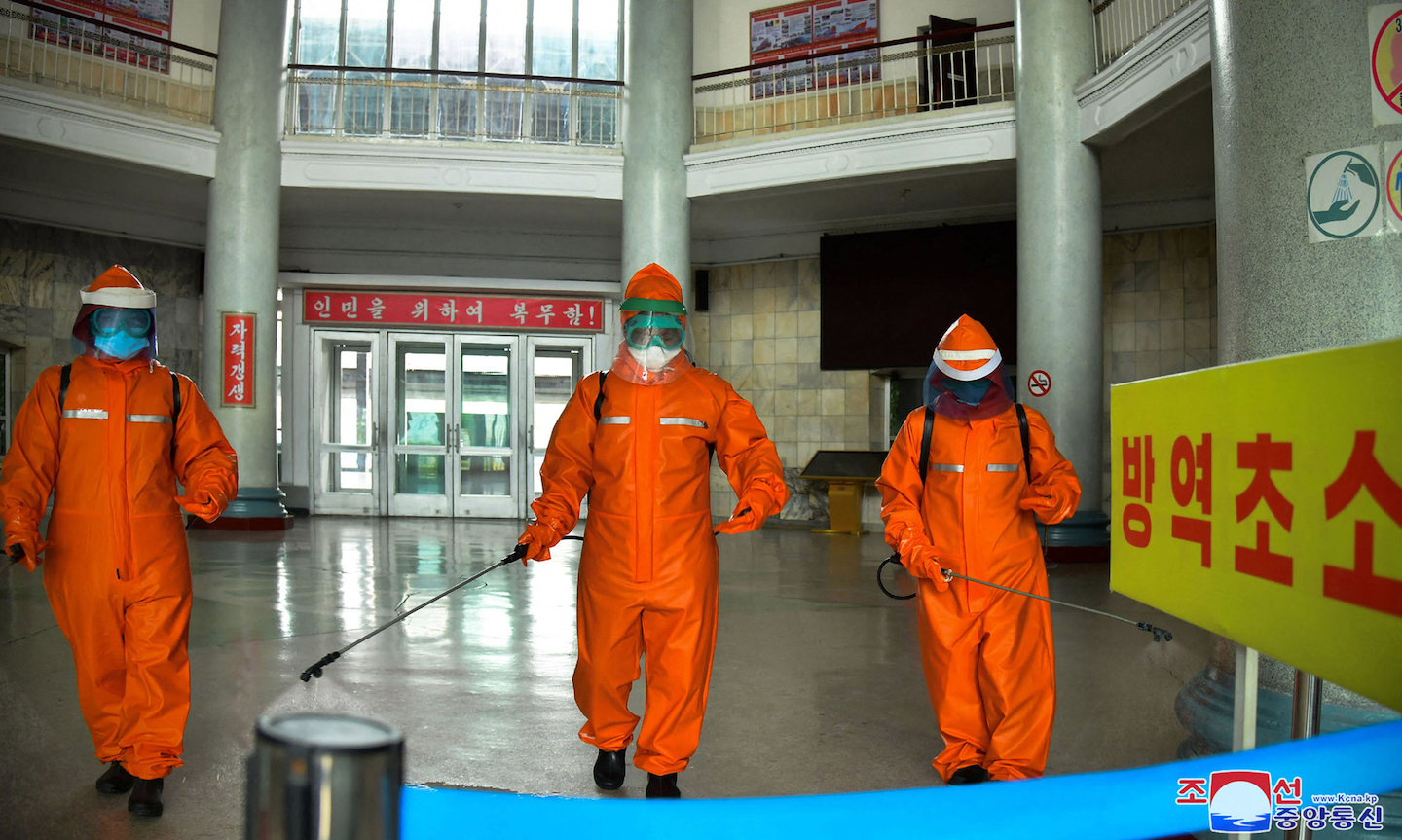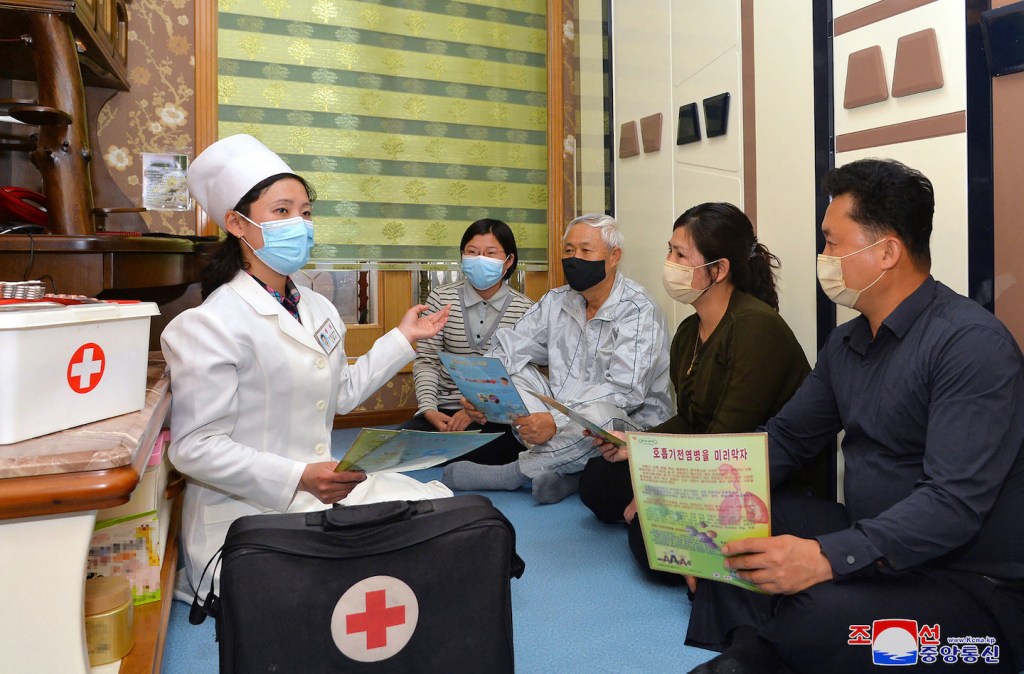North Korea’s army rallies to save its people, dutifully prepared to distribute medicines amid the country’s first COVID-19 outbreak. Government workers spray disinfectant and wipe down surfaces; nurses educate people on hygiene in seemingly staged scenes; baskets of fresh food are delivered; and pharmacy workers distribute “elixirs” for the sick.
These are just some of the images the Democratic People’s Republic of Korea government wants you to see—all of them, of course, carefully vetted and curated by Kim Jong Un’s government, with the regime’s propaganda machine going into overdrive as a public health crisis engulfs the country.
Videos by VICE
While the images portray a robust, comprehensive, and effective public health response from the government, official reports and statistics coming out of the country paint a much bleaker and less controlled picture.


As of Tuesday night, five days since Kim Jong Un publicly declared that COVID’s highly infectious Omicron variant had been detected within North Korean borders, the total number of citizens suffering symptoms of a “fever” rose to 1,715,950. More than 1 million of those have reportedly recovered, while at least 691,000 are under medical treatment, and the total number of deaths rose to 62.
The nation is devastatingly under-resourced when it comes to public health infrastructure and mass testing capabilities, which means the government can’t officially confirm that all these cases are COVID. It also means, however, that the real number of infections and deaths from COVID are almost certainly much higher.
At a meeting held on Tuesday by the Presidium of the Political Bureau of the Central Committee of the Workers’ Party of Korea, the government’s highest decision-making body, Kim blamed the outbreak on the “immaturity,” “slackness” and “non-positive attitude” of state officials. He claimed such “evils and defects” hampered the country’s epidemic response in the early stages, when time was of the essence.


Earlier in the week, the North Korean leader called for the mobilisation of military personnel from the People’s Army to stabilise the supply of medicine in Pyongyang—delivering what state media refers to as “the elixir of life”.
He also accused the public health sector of not having “rolled up their sleeves” or “properly recognising the present crisis.”


Experts have warned that the situation in North Korea could deteriorate into a large-scale catastrophe.
The nation is one of only two, along with Eritrea, not to have rolled out COVID vaccines to its population; its public health infrastructure is among the world’s worst; and, having been one of the first to slam its trade borders shut in the early days of what is now a years-old pandemic, its economy is on its knees.


Even before the pandemic, back in 2019, the country was reporting major food shortages as a result of poor harvests, while humanitarian aid to the country has been steadily dropping over the past decade.
The factors of poverty, malnutrition, and a population that presumably has little to no immunity against COVID-19 are converging to create what one expert described as a “perfect storm.”
“People are not vaccinated, people are in poor health, and the government doesn’t seem to have a responsible approach to prevent all this to begin with,” Ethan Jewell, a Seoul-based data correspondent with outlet NK News, which provides news and analysis about North Korea, told VICE World News.
“[Their zero COVID approach] is resulting in what could be a complete humanitarian disaster.”


Jacob Lee, professor of infectious diseases at South Korea’s Hallym University Kangnam Sacred Heart Hospital, gave an even more dire assessment.
“No North Korean is immunised and well-nourished,” he told VICE World News. “So it’ll probably result in mass death.”
Such language—”perfect storm”, “mass death”, “complete humanitarian disaster”—doesn’t chime with the images coming out of the so-called hermit kingdom.
The few photographs from inside North Korea that have surfaced on the internet over the past six days show an organised, compliant populace carrying on with their lives in a calm and orderly fashion.
Every one of these images has been captured by reporters working for North Korean state media, and together comprise the selective narrative that the government has decided to show the world. Colin Zwirko, senior analytical correspondent at NK News, told VICE World News that photos like these are “100 percent” vetted by the Kim regime.

They almost definitely don’t capture the full reality of the situation on the ground, though. Even as cases of infection soar and hundreds of thousands of people are placed under emergency medical treatment, there are certain scenes and details that are glaringly absent from the local coverage.
“North Korean state media is not yet showing any kind of treatment, any images of treating citizens, of people in hospital beds—they’re not showing anything like that,” Zwirko pointed out. “What they are showing is interviews with people in their homes, talking about how they were sick a few days but they recovered just fine, and a lot of public service announcements, propaganda, [and] animated videos sort of downplaying the seriousness of the BA.2 Omicron strand.”

Zwirko said the coverage stands in stark contrast to the way the media around the world have covered COVID outbreaks over the past two and a half years, where shots of mass graves and hospital beds and other “dire” scenes are commonplace.
“Right now they’re showing us evidence of a lockdown, and they are trying to reassure citizens by airing a lot of videos of interviews and print media about how you can quarantine and recover,” he said.
“But I wouldn’t expect them to show human suffering at any stage, even if there was.”
Follow Gavin Butler on Twitter.







